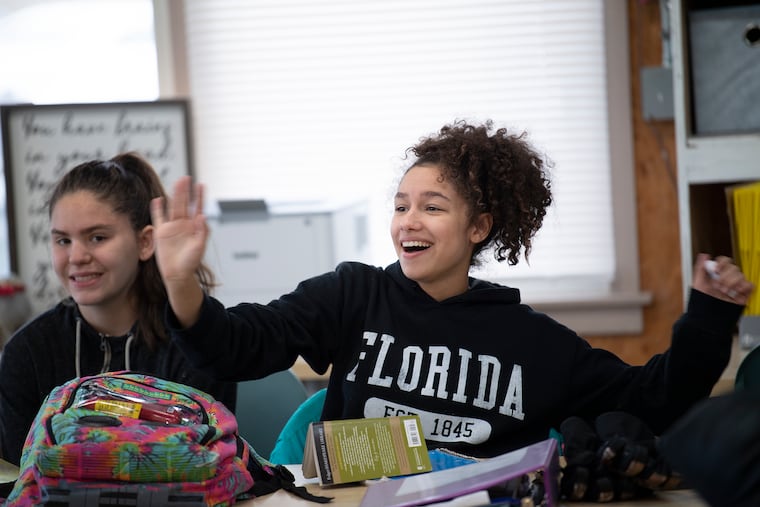How a chicken farm and arts camp became one of South Jersey’s newest charter schools
Selected by lottery, students come from 22 districts in Salem, Atlantic, Cumberland, Gloucester, and Camden Counties and can choose from five majors: music, dance, technical theater, visual arts, and digital media.

For years, Appel Farm Arts and Music Center in Salem County was an arts summer camp for children and a popular destination where thousands of visitors enjoyed live music on a former chicken farm.
Located on a rural road dotted with farms in Upper Pittsgrove Township, Appel Farm is now home to one of New Jersey’s newest charter schools, with a unique learning environment and a curriculum that focuses on integrated arts for middle schoolers.
The Creativity CoLaboratory Charter School is exactly what Cori Solomon, one of its founders, envisioned. The arts-based school opened in September, enrolling 96 students in grades five through eight. Selected by lottery, students come from 22 districts in Salem, Atlantic, Cumberland, Gloucester, and Camden Counties and can choose from five majors: music, dance, technical theater, visual arts, and digital media.
“It seemed obvious that we should start a school,” said Solomon, a former teacher who joined Appel Farm as a camp director in 2007 and was named executive director in 2014. “My biggest fear was that we would end up like every other school."
» READ MORE: Camden's first charter school, LEAP Academy, marks 20th year
With a staff including nine teachers, a social worker, and a nurse, Creativity CoLaboratory is the first charter in Salem County. It differs from most of New Jersey’s 88 charter schools, which enroll 55,000 students statewide, and are mainly clustered around major urban centers. Camden, for instance, has five charters.
“Charter schools come in a lot of different sizes and shapes,” said Harry Lee, president of the New Jersey Charter Schools Association.
Appel Farm opened as a summer arts camp for children in 1960, but it traces its roots to the 1940s, when it was a musical gathering place for the friends and relatives of Albert Appel and his wife, Clare, both amateur classical musicians.
The couple started off raising chickens and eventually started the camp to teach music and art to their own children. Appel Farm developed into a cultural treasure, hosting summer music festivals and affecting thousands of children through school arts programs.
Critics such as Betsy Ginsburg, executive director for the Garden State Coalition of Schools, a group representing suburban districts, worry about the financial impact of charters on traditional public schools. School districts pay the per-pupil and transportation costs for students within their borders who choose a charter school.
But Creativity CoLaboratory fills a void for districts unable to afford extensive arts programs, Ginsburg said.
“This is an interesting addition to the New Jersey charter universe,” she said.
Classes are small, limited to 12 students, and each are allowed to call teachers by their first names.
“It helps you to get to know them better," said Addison Reichner, 13, of Pittsgrove. “I absolutely love it."
Another perk hailed by students is no homework. With an extended day from 8:30 a.m. to 4 p.m., Solomon said, there is enough time to cover lessons during the school day. Extracurricular activities are also held during the day.
Each day includes two 15-minute breaks, a 30-minute lunch, and a mandatory 30-minute outdoors recess — rain or shine. The students vent steam by running around the property, digging holes, or climbing trees on the 115-acre farm, home to a gaggle of wild turkeys and countless birds.
Instead of traditional letter grades, the school uses standards-based grading, and labels that reflect a student’s educational climb: base camp, exploring, hiking, summiting and then, as the highest, soaring. The grades will be transferred to letter values when the students move to high school.
“I just think it’s a wonderful place to be,” said eighth grader Isabella Perez, 13, of Newfield in Gloucester County.
» READ MORE: School choice has not cured Philadelphia’s ailing system
During a recent period in Pam Matusz’s English arts class, eighth graders took turns reading aloud from A Midsummer Night’s Dream, which they will perform at the end of the quarter. One girl who needed a break left her desk to stretch out on a sofa. Next door, a student stretched out on the floor, with his math book. Every classroom has alternate seating options, such as bean bags and yoga balls; students who may feel overwhelmed are encouraged to use them.
“As a teacher, it’s a dream come true,” said Pam Matusz, who previously taught in Millville and Camden. “This is definitely the way it should be.”
Every week, the school brings in outside artists to teach. The subject is then tied to academics. For example, a photographer recently taught students how to turn their cellphone photos into black-and-white prints. Students got a science lesson on the chemical process used in the campus’ darkroom.
» READ MORE: Charter school foes tell NJ education officials: Enough already
Unlike most charters, Creativity CoLaboratory didn’t have to acquire a school. It set up classrooms in some of the three dozen buildings on the farm. Some include dorms, which will be used for twice-yearly overnight camps for students.
For every marking period, grades must address an essay question. For this quarter, sixth graders are tackling “What does it mean to be courageous?” Inspiring messages line the walls. In Janel Schafer’s seventh-grade math class, a sign reads: “Be the change you want to see in the world.”
Already, there is a wait list with 70 students for the 2020-21 school year. The school plans to add 48 fifth- and six-grade seats.
There are no immediate plans to add high schoolers, but Solomon left open that possibility in the future.
“We need to get through the first year,” Solomon said with a smile.